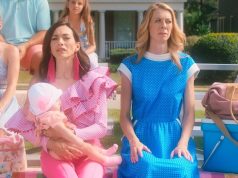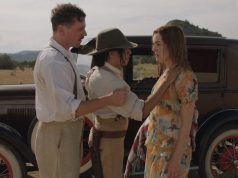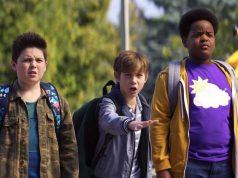You see, in Australia, everything is backwards. Our winter is their summer. Our vermin is their dinner. Our dull, navel-gazing coming-of-age stories are their best films of the year, worthy of sweeping the Australian Film Institute awards.
How a down-to-earth country like Australia grew so attached to the pretentious “Somersault,” I have no idea. The feature debut of writer/director Cate Shortland, it is the story of a trampy 16-year-old girl named Heidi (Abbie Cornish) who runs away from home after her trampy mother catches her kissing her — that is to say, Mom’s — boyfriend. What happens when Heidi runs away? Why, a personal journey of discovery, of course!
Believing she can get a job working for a man she once slept with (it is implied), she goes to a rural ski-resort town currently in the off-season. It’s a tiny village where everyone knows everyone else, and where her first instinct is to make money by prostituting herself. When that fails, she takes a job as a cashier in a convenience store, working alongside a girl her age named Bianca (Hollie Andrew), who takes a fast disliking to her.
With an apartment sublet to her by the kindly motel proprietress Irene (Lynette Curran), Heidi establishes something of a life in the town. She even acquires something of a boyfriend, Joe (Sam Worthington), who is periodically aloof and who might have personal issues of his own to work out. (The film gives them a passing glance, then ignores them.)
That Heidi has a skewed perspective of sexuality is a given, and it’s plain she learned it from her mother (Olivia Pigeot), who looks like she could be her sister and who isn’t much of an example of healthy grownup behavior. But though the film shows us Heidi’s constant cycle of feeling miserable, trolling for sex, then feeling miserable again, it doesn’t delve into her character any deeper than that.
The film has an ethereal beauty to it, though, at least visually. Shortland was going for melancholy, and she sure got it. Robert Humphreys’ cinematography is actually quite lovely, with a lot of scenes set in either the pale blues of midnight or the grayish blues of dawn, and the colors establish the tone nicely. So, too, does Heidi’s fascination with scrapbooking — remembering the past wistfully — though I probably could have done without the moment where Heidi literally looks at the world through rose-colored glasses (ski goggles, actually). Ditto the one where Joe looks through a rose-colored drinking glass. It’s cute when metaphors come to life, but come on.
C (1 hr., 46 min.; )





